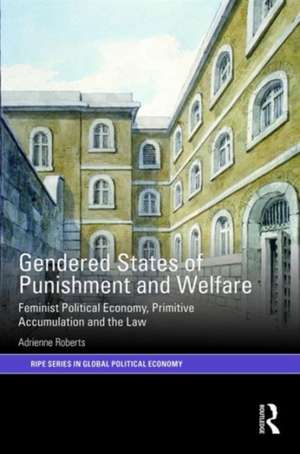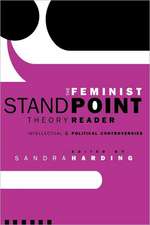Gendered States of Punishment and Welfare: Feminist Political Economy, Primitive Accumulation and the Law: RIPE Series in Global Political Economy
Autor Adrienne Robertsen Limba Engleză Hardback – 22 sep 2016
The book reveals that the law, along with social welfare regimes, have operated in ways that are highly gendered, as gender – along with race – has been a key axis along which difference has been constructed and regulated. It offers an important theoretical and empirical contribution that disrupts the tendency for mainstream and critical work within IPE to view capitalism primarily as an economic relation. Roberts also provides a feminist critique of the failure of mainstream and critical scholars to analyse the gendered nature of capitalist social relations of production and social reproduction.
Exploring a range of issues related to the nature of the capitalist state, the creation and protection of private property, the governance of poverty, the structural compulsions underpinning waged work and the place of women in paid and unpaid labour, this book is of great use to students and scholars of IPE, gender studies, social work, law, sociology, criminology, global development studies, political science and history.
| Toate formatele și edițiile | Preț | Express |
|---|---|---|
| Paperback (1) | 272.50 lei 6-8 săpt. | |
| Taylor & Francis – 12 dec 2019 | 272.50 lei 6-8 săpt. | |
| Hardback (1) | 1053.16 lei 6-8 săpt. | |
| Taylor & Francis – 22 sep 2016 | 1053.16 lei 6-8 săpt. |
Din seria RIPE Series in Global Political Economy
-
 Preț: 310.75 lei
Preț: 310.75 lei -
 Preț: 280.02 lei
Preț: 280.02 lei -
 Preț: 281.27 lei
Preț: 281.27 lei -
 Preț: 310.01 lei
Preț: 310.01 lei -
 Preț: 390.13 lei
Preț: 390.13 lei -
 Preț: 288.81 lei
Preț: 288.81 lei - 28%
 Preț: 820.21 lei
Preț: 820.21 lei - 18%
 Preț: 700.75 lei
Preț: 700.75 lei -
 Preț: 386.55 lei
Preț: 386.55 lei -
 Preț: 470.90 lei
Preț: 470.90 lei - 18%
 Preț: 999.82 lei
Preț: 999.82 lei - 18%
 Preț: 1054.97 lei
Preț: 1054.97 lei - 18%
 Preț: 1057.40 lei
Preț: 1057.40 lei - 18%
 Preț: 1055.60 lei
Preț: 1055.60 lei - 18%
 Preț: 1053.16 lei
Preț: 1053.16 lei -
 Preț: 362.26 lei
Preț: 362.26 lei -
 Preț: 456.16 lei
Preț: 456.16 lei - 18%
 Preț: 1058.79 lei
Preț: 1058.79 lei - 18%
 Preț: 1057.89 lei
Preț: 1057.89 lei - 28%
 Preț: 822.54 lei
Preț: 822.54 lei -
 Preț: 278.75 lei
Preț: 278.75 lei - 18%
 Preț: 1056.47 lei
Preț: 1056.47 lei - 18%
 Preț: 1057.89 lei
Preț: 1057.89 lei - 18%
 Preț: 1054.89 lei
Preț: 1054.89 lei -
 Preț: 453.96 lei
Preț: 453.96 lei -
 Preț: 411.42 lei
Preț: 411.42 lei -
 Preț: 428.67 lei
Preț: 428.67 lei - 28%
 Preț: 821.53 lei
Preț: 821.53 lei -
 Preț: 487.86 lei
Preț: 487.86 lei -
 Preț: 353.94 lei
Preț: 353.94 lei - 30%
 Preț: 846.78 lei
Preț: 846.78 lei - 31%
 Preț: 766.24 lei
Preț: 766.24 lei - 18%
 Preț: 1058.43 lei
Preț: 1058.43 lei - 15%
 Preț: 425.07 lei
Preț: 425.07 lei - 18%
 Preț: 696.82 lei
Preț: 696.82 lei -
 Preț: 395.16 lei
Preț: 395.16 lei - 18%
 Preț: 700.31 lei
Preț: 700.31 lei - 18%
 Preț: 1004.20 lei
Preț: 1004.20 lei -
 Preț: 465.69 lei
Preț: 465.69 lei - 15%
 Preț: 672.40 lei
Preț: 672.40 lei - 18%
 Preț: 1016.52 lei
Preț: 1016.52 lei - 18%
 Preț: 1115.21 lei
Preț: 1115.21 lei -
 Preț: 485.07 lei
Preț: 485.07 lei
Preț: 1053.16 lei
Preț vechi: 1284.34 lei
-18% Nou
Puncte Express: 1580
Preț estimativ în valută:
201.55€ • 218.85$ • 169.30£
201.55€ • 218.85$ • 169.30£
Carte tipărită la comandă
Livrare economică 23 aprilie-07 mai
Preluare comenzi: 021 569.72.76
Specificații
ISBN-13: 9781138678422
ISBN-10: 1138678422
Pagini: 214
Ilustrații: 14
Dimensiuni: 156 x 234 x 18 mm
Greutate: 0.41 kg
Ediția:1
Editura: Taylor & Francis
Colecția Routledge
Seria RIPE Series in Global Political Economy
Locul publicării:Oxford, United Kingdom
ISBN-10: 1138678422
Pagini: 214
Ilustrații: 14
Dimensiuni: 156 x 234 x 18 mm
Greutate: 0.41 kg
Ediția:1
Editura: Taylor & Francis
Colecția Routledge
Seria RIPE Series in Global Political Economy
Locul publicării:Oxford, United Kingdom
Public țintă
Postgraduate and UndergraduateCuprins
Introduction
The Anglo-American Lockdown
Towards a Feminist Historical Materialism
Competing Explanations
A Note on Case Studies and Approach
Outline and Organization of the Argument
1. The Making of Global Capitalism: A Feminist Historical Materialist Analysis
Premise 1: The Law as Primitive Accumulation
Premise 2: Primitive Accumulation as a Gendered Process
Premise 3: The Law as Part of the Gendered Social Ontology of Capitalism
2. The Law, Private Property and the Gendered Poor in the Transition to Capitalism
Poverty, Poor Laws and the Bloody Legislation
The Legal Regulation of Gender
The Early Capitalist Gender Order
3. The Liberal Governance of Criminality and the Myths of Laissez-Faire
The Rise of ‘Liberal’ Governance: Legitimacy, Crowd and the Problem of Poverty
The (Gendered) Ideology of Liberal Political Economy
Disciplining and Responsibilizing the Poor and Criminalized Population: The New Poor Laws, Prisons and the Police
The Gendered Dimensions of Nineteenth Century Governance
4. The Modern Governance of Poverty and Criminality: Penal-Welfare Paternalism
The Rise of Penal-Welfare Paternalism: Monopoly Capitalism, Organized Labour and the Breakdown of Laissez-Fairism
Theorizing Penal-Welfare Paternalism
Reproducing Class, Gender and Race through the Paternal Penal-Welfare State
5. Governing of Social Marginality in an Era of Disciplinary Neoliberalism
The Neoliberal Governance of Criminality
The Neoliberal State and the Power-Production-Social Reproduction Nexus
On-Going Primitive Accumulation and the Criminalization of Homelessness
6. Producing Gendered Precariousness and Criminalized Women
Gendered Precariousness and the Neoliberal Restructuring of Production
The ‘Reprivatization’ of Social Reproduction
Gendered Precariousness and the Criminalization of Women
Conclusion
The Anglo-American Lockdown
Towards a Feminist Historical Materialism
Competing Explanations
A Note on Case Studies and Approach
Outline and Organization of the Argument
1. The Making of Global Capitalism: A Feminist Historical Materialist Analysis
Premise 1: The Law as Primitive Accumulation
Premise 2: Primitive Accumulation as a Gendered Process
Premise 3: The Law as Part of the Gendered Social Ontology of Capitalism
2. The Law, Private Property and the Gendered Poor in the Transition to Capitalism
Poverty, Poor Laws and the Bloody Legislation
The Legal Regulation of Gender
The Early Capitalist Gender Order
3. The Liberal Governance of Criminality and the Myths of Laissez-Faire
The Rise of ‘Liberal’ Governance: Legitimacy, Crowd and the Problem of Poverty
The (Gendered) Ideology of Liberal Political Economy
Disciplining and Responsibilizing the Poor and Criminalized Population: The New Poor Laws, Prisons and the Police
The Gendered Dimensions of Nineteenth Century Governance
4. The Modern Governance of Poverty and Criminality: Penal-Welfare Paternalism
The Rise of Penal-Welfare Paternalism: Monopoly Capitalism, Organized Labour and the Breakdown of Laissez-Fairism
Theorizing Penal-Welfare Paternalism
Reproducing Class, Gender and Race through the Paternal Penal-Welfare State
5. Governing of Social Marginality in an Era of Disciplinary Neoliberalism
The Neoliberal Governance of Criminality
The Neoliberal State and the Power-Production-Social Reproduction Nexus
On-Going Primitive Accumulation and the Criminalization of Homelessness
6. Producing Gendered Precariousness and Criminalized Women
Gendered Precariousness and the Neoliberal Restructuring of Production
The ‘Reprivatization’ of Social Reproduction
Gendered Precariousness and the Criminalization of Women
Conclusion
Notă biografică
Adrienne Roberts is Lecturer in International Politics at the University of Manchester, UK. She works in the areas of IPE, feminist political economy, finance, debt and debt-driven development. Her work has been published in a number of leading academic journals.
Recenzii
'Timely and trenchant, Roberts cogently demonstrates how primitive accumulation, punitive legislation and gendered oppressions are constitutive of capitalism’s historical and contemporary practices – with corollary implications for centralizing gendered and racialized processes in analyses of, and struggles against, today’s global lockdown.' - V Spike Peterson, University of Arizona, Tucson, USA
'In this fascinating study, Adrienne Roberts combines a historical analysis with the so called ‘extra-economic’ forms of coercion. As such it focuses on crime, criminalization, discipline and punishment from a feminist historical materialist perspective. By including these ‘extra-economic forms’ it sheds light on a largely neglected area in IPE of the increasing criminalization of poor women.' - Brigitte Young, University of Münster, Germany
'Powerfully argued, well documented, and treating a subject at the center of social activism and political debate, Adrienne Roberts' book is a major contribution to a feminist analysis of the disciplining of women in capitalist society.' - Silvia Federici, Hofstra University, USA
'In this fascinating study, Adrienne Roberts combines a historical analysis with the so called ‘extra-economic’ forms of coercion. As such it focuses on crime, criminalization, discipline and punishment from a feminist historical materialist perspective. By including these ‘extra-economic forms’ it sheds light on a largely neglected area in IPE of the increasing criminalization of poor women.' - Brigitte Young, University of Münster, Germany
'Powerfully argued, well documented, and treating a subject at the center of social activism and political debate, Adrienne Roberts' book is a major contribution to a feminist analysis of the disciplining of women in capitalist society.' - Silvia Federici, Hofstra University, USA
Descriere
This book presents a feminist historical materialist analysis of how the law, policing and penal regimes have overlapped with social policies to coercively discipline the poor and marginalized sectors of the population throughout the history of capitalism. It explores issues related to the nature of the capitalist state, the creation and protection of private property, the governance of poverty, the structural compulsions underpinning waged work and the place of women in paid and unpaid labour. It offers an important theoretical and empirical contribution that disrupts the tendency for mainstream and critical work within IPE to view capitalism primarily as an economic relation.















